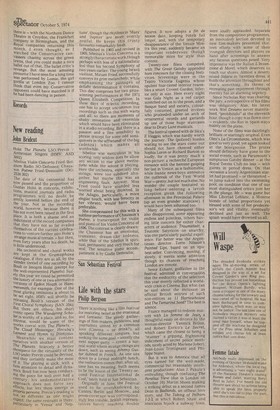San Sebastian Festival
Life with the stars
Philip Bergson
There is nothing like a film festival for restoring belief in the irrational and fantastic. The
gaudy gatherings of film-makers, publicists, and Journalists united by a common love (Cinema or drink?), all speaking different tongues, but seeking the same goal usually the next supper-party create a surreal world where strange things are down, such as seeing Johnny Guitar dubbed in French. As one sits down to a formal midnight lunch, the realisation comes that, after all, time has no meaning. Such seems to be the lesson of the 'Twenty-second Festival International de Cine,' lately held in San Sebastian.
-Originally in June, the Festival used to be overshadowed by Cannes. Berlin and Moscow, and press-coverage was correspondingly less voluble, British representatives barely reaching double figures. It now adopts a fin de saison date, keeping hotels full longer, and, with the temporary disappearance of the Venice Mostra this year, suddenly became an important rendezvous, though memorable more for style than content. Twenty-one films competed. with The Great Gatsby appended hors concours for the closing festivities. Screenings were in the Teatro Victoria Eugenia whose opulent four-tiered interior resembles a smart Covent Garden, inferior only in size. Here every night was Gala Night as a red carpet stretched out on to the prom, and a Basque band and escorts, colourfully costumed, greeted invitees who proceeded under an arch of ornamental swords and garlands up one of those huge staircases dear to Drury Lane musicals.
The festival opened with de Sica's II Viaggio, which was hardly worth the journey. The (policed) hordes waiting to see the stars come out should not have cheered either Sophia Loren or Richard Burton so loudly, for it was pretty much a non-picture: a recherche European romance with the heroine gasping her last in Venice, as is fashionable, while frantic news-boys announce the outbreak of the First World War —pretty, but not much else. No wonder the couple hesitated so long before entering a lavish reception given the following afternoon in the Provincial Palace (up an even grander staircase). I would have been ashamed too.
Many of the subsequent films also disappointed, some appearing endless and pointless, others having little concern for either characters or audience, Traumstadt, a Teutonic Satyricon on anarchy, was one particularly painful experience. Far better was the Argentinian director Torre Nilsson's Painted Lips, based on an epic best-seller. Convincing, moving, if slowly, it merits some attention though its chances of reaching London are remote. Senor Echarri, godfather to the festival, admitted in conversation that the mediocrity of the selection this year merely reflected a worldwide crisis in Cinema. But what can be said about the inclusion as official British entries of such non-entities as 11 Harrowhouse and The Tamarind Seed? The best is silence.
France managed to redeem matters with La femme de Jean, a thoughtful essay on divorce by the woman-director Yannick Bellon, and Robert Enrico's Le Secret, which came the closest to being a "stunner” a gripping, frightening indictment of secret police methods, nicely acted by Marlene Jobert, Jean-Louis Trintignant and Philippe Noiret. But it was to America' that all eyes turned for the well-made, commercial but reasonably intelligent productions: Alan J. Pakula's enthralling, though confusing The Parallax View (due in London on October 10), Martin Sheen making a striking debut as a second James Dean in Badlands, an offbeat love story, and The Taking of Pelham 1-2-3, in which Robert Shaw and associates hijack a subway train,
were loudly applauded. Separate from the competition programmes, an innovatory section devoted to new film-makers presented thir: teen efforts with some of their youngish directors and players on hand after screenings to answer any fatuous questions posed. Very impressive was the Italian L'invenzione di Morel, which deserves to reach our shores. Almost a desertisland Solaris in 'twenties dress, it holds the attention throughout and that's something. Its theme of recreating past enjoyment through eternity has an alarming urgency.
Since Nicholas Ray was chairing the jury, a retrospective of his films was obligatory, Alas, his latest work Wet Dreams never materialised, "prohibitido" at the eleventh hour, though a copy was flown over evidently, the Ray in Spain stays mainly on the plane.
None of the films was dazzlingly brilliant or startingly original. Even Olmi's La Circonstanza, which was good to very good, yet again looked at the bourgeoisie. The prizes should definitely have gone to the social events, such as Paramount's sumptuous Gatsby dinner at the Royal Tennis Club no less with guests in period dress. On that occasion a lovely Argentinian starlet had promised or threatened to jump naked into the swimming pool, on condition that one of our most distinguished critics join her in the plunge. Mr was game but Miss Libertad Leblanc, a Monroe blonde of lethal proportions yet blessed with some of her predecessor's wit and vitality, eventually ,declined and just as well. The splash would have drowned us all,
































 Previous page
Previous page